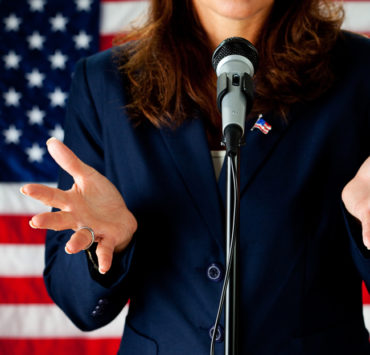Celebrating 100 Years of Women’s Suffrage
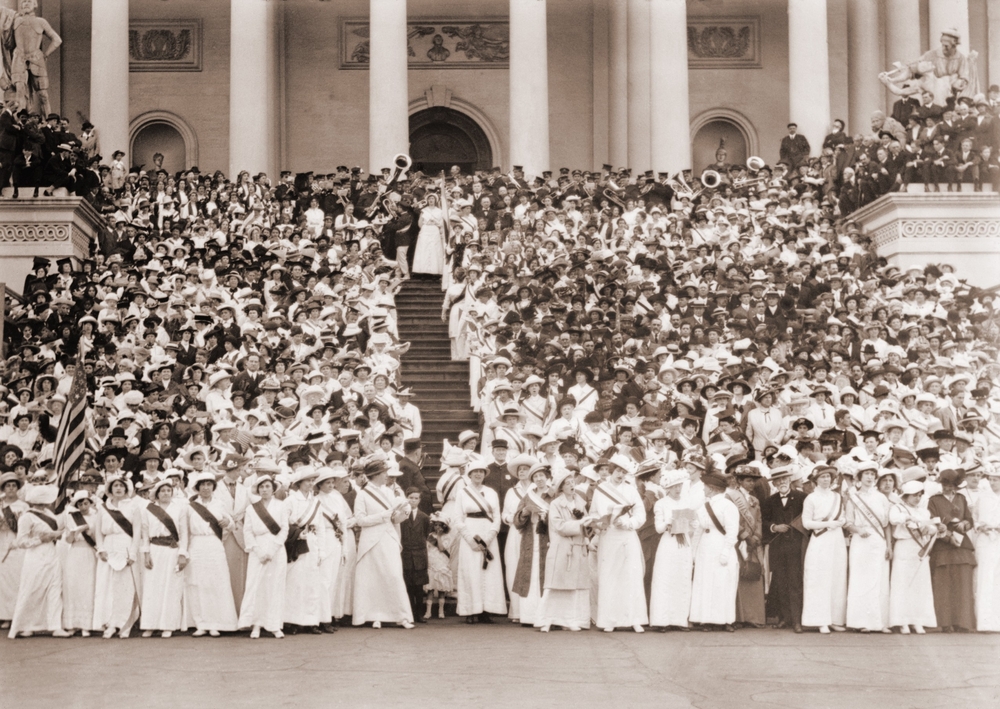
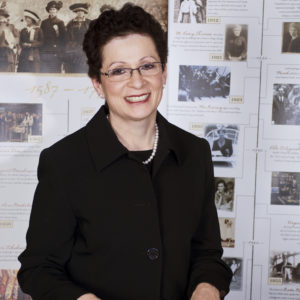
Jill S. Tietjen, PE, is an author, national speaker, and…
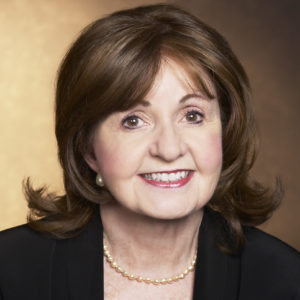
Charlotte S. Waisman, Ph.D. is a national champion and advocate…
August 26 is known as “Equality Day.” That is because on August 26, 1920, the Nineteenth Amendment to the U.S. Constitution was ratified giving women the right to vote. Interestingly, Tennessee was the 36th state to ratify (there were 48 states at the time – Hawaii and Alaska weren’t states yet) and the margin of that vote was – ONE. In previous columns, we have profiled a number of suffragists including Elizabeth Cady Stanton, Susan B. Anthony, Lucretia Mott, Alice Paul, Anna Howard Shaw, and Carrie Chapman Catt. In this column, in honor of the 100th anniversary of women’s enfranchisement, we profile other suffragists without whom the movement would not have been successful.
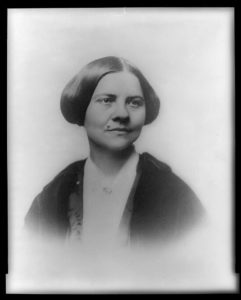
By 1847 when she became the first woman from Massachusetts to earn a college degree, Lucy Stone had already determined some significant ways she would conduct her life. Dismayed by the subjugation of women that she observed firsthand in her family and in society in general including lower pay for the same work, Stone vowed she would not marry, she would obtain the highest education she could, and she would become economically self-sufficient by earning her own livelihood. She became a vocal advocate for abolition, and women’s rights writing articles and lecturing around the country. Stone did marry and famously did not take her husband’s last name. Her daughter, Alice Stone Blackwell, became a leader in the suffrage movement. Stone has been inducted into the National Women’s Hall of Fame and was featured on a U.S. postage stamp in 1968.
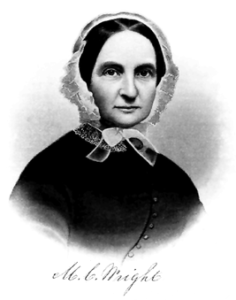
Raised in the Quaker faith and thus a believer in the equality of the sexes, Martha Coffin Wright was an abolitionist and suffragist. She helped plan the first women’s rights convention in 1848 held at the Wesleyan Chapel in Seneca Falls (the birthplace of women’s rights and the home of the National Women’s Hall of Fame). For the next twenty years, Wright was dedicated to anti-slavery and women’s rights causes. She traveled extensively and served as the President of the National Woman Suffrage Association. She has been inducted into the National Women’s Hall of Fame.
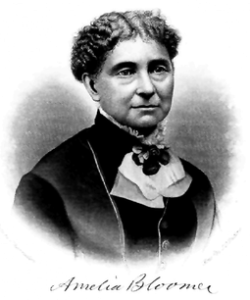
Amelia Bloomer, whose wedding vows omitted the word “obey”, began her activist activities by writing articles for a temperance journal in Seneca Falls. Bloomer attended the 1848 Seneca Falls Women’s Rights Convention. In 1849, she began publishing the Lily, which carried articles written about women’s rights by Elizabeth Cady Stanton, as well as temperance articles. By the early 1850s, Bloomer had defended the wearing of pantelettes and began herself to wear what became known as the “Bloomer Costume.” She wore the clothing as she became an active speaker on the women’s rights circuit. After a while, however, because she feared her clothing was diverting attention from the cause of women’s rights, she returned to more conventional attire. After Bloomer and her family moved to Council Bluffs, Iowa, she served as president of the Iowa Woman Suffrage Society and continued her women’s rights work there. Bloomer has been inducted into the National Women’s Hall of Fame.
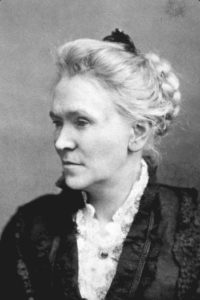
Matilda Joslyn Gage began her association with the women’s rights movement at the 1852 National Women’s Rights Convention in Syracuse, New York. Too soft-spoken to be an effective speaker, she found her voice through her writings. She edited the newspaper of the National Woman Suffrage Association, wrote pamphlets and worked on the first three volumes of the History of Woman Suffrage with Susan B. Anthony and Harriot Stanton Blatch. Later, she formed her own organization to advocate for women’s rights. Her gravestone contains her lifelong motto: “There is a word sweeter than Mother, Home, or Heaven: that word is Liberty. Gage has been inducted into the National Women’s Hall of Fame.
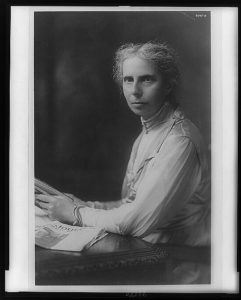
Although she had been resentful of the time her mother, Lucy Stone, had devoted to the suffrage movement when she was a child, Alice Stone Blackwell became a staunch supporter of women’s rights in her adulthood. She wrote columns on suffrage that were distributed to newspapers around the country. Tired of the schism in the women’s rights movement (there were two separate organizations working at cross purposes from 1869 to 1890), she helped identify the issues that separated the associations and she was able to bring them together. For two decades she served as recording secretary of the merged National American Woman Suffrage Association.
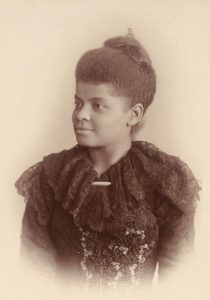
A fearless campaigner for rights for all people, Ida B. Wells (also known as Ida B. Wells-Barnett) was a slave, who was freed by the Emancipation Proclamation. She moved from Mississippi to Memphis, Tennessee in search of higher-paying employment. There she served as a teacher and she co-owned a newspaper. She was a tireless crusader against lynching, including writing about the topic in her newspaper. Sadly, this led to the destruction of the newspaper’s presses by a white mob; she was forced to relocate. The Red Record, a pamphlet that she authored in 1895, significantly influenced the national debate on lynching. Wells remained active in the civil rights movement after moving to Chicago and after her marriage. She was one of the founders of the National American Association of Colored People, today called the NAACP. In 1893, she founded The Women’s Era Club, a civic organization for African American women. Wells was also active in the women’s suffrage movement. She has been inducted into the National Women’s Hall of Fame and was featured on a U.S. postage stamp in 1990.
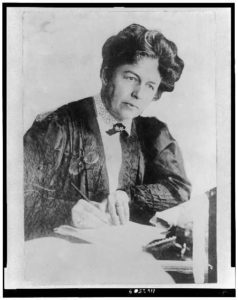
The daughter of suffragist Elizabeth Cady Stanton, Harriot Stanton Blatch worked on the History of Woman Suffrage with Susan B. Anthony and Matilda Joslyn Gage. Her efforts to successfully include both women’s suffrage organizations in that history helped lead to the reconciliation of the leaders of each and the eventual merger of the two organizations. After some time in England, she returned to the U.S. in 1902 and worked to reinvigorate the women’s suffrage movement, including recruiting working women to the cause. She led the 1910 New York suffrage parade and worked to successfully lobby the New York legislature to enfranchise women – which occurred in 1917. She later became active in politics and supported the work of the League of Nations (which became the United Nations).
Women participate and contribute to every area of our lives. These amazing suffragists, as well as many others, almost all of whom we have not heard about nor learned about in school, are profiled in our book, Her Story: A Timeline of the Women Who Changed America. Help us by continuing to tell women’s stories. Write women back into history! Tell young women especially, that their dreams in any field of endeavor or interest, can become a reality.
Author: Jill Tietjen
Jill S. Tietjen, PE, is an author, national speaker, and an electrical engineer. After 40 years in the electric utility industry, her professional focus is now on women’s advocacy, worldwide. She blogs for The Huffington Post, speaks nationally on the accomplishments of women, nominates women for awards, and continues to write books (8 published to date), following in the footsteps of her bestselling and award-winning book, Her Story: A Timeline of the Women Who Changed America (written with Charlotte Waisman). She is a frequent keynote speaker as her positive energy and her ability to relate to the audience result in inspired and energized listeners. The recipient of many awards, her induction into the Colorado Women’s Hall of Fame in 2010 remains one of her most treasured.

Jill S. Tietjen, PE, is an author, national speaker, and an electrical engineer. After 40 years in the electric utility industry, her professional focus is now on women’s advocacy, worldwide. She blogs for The Huffington Post, speaks nationally on the accomplishments of women, nominates women for awards, and continues to write books (8 published to date), following in the footsteps of her bestselling and award-winning book, Her Story: A Timeline of the Women Who Changed America (written with Charlotte Waisman). She is a frequent keynote speaker as her positive energy and her ability to relate to the audience result in inspired and energized listeners. The recipient of many awards, her induction into the Colorado Women’s Hall of Fame in 2010 remains one of her most treasured.

Charlotte S. Waisman, Ph.D. is a national champion and advocate for women as a professor and keynote speaker. A corporate leader, executive coach, and facilitator, she conducts leadership workshops nationally.



